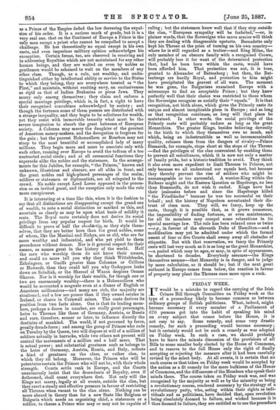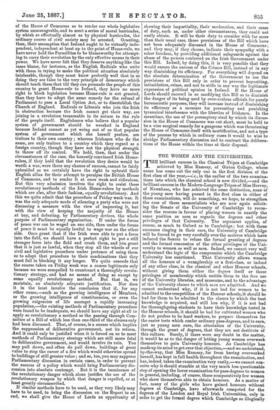FRIDAY WEEK.
TT would be a mistake to regard the carrying of the Irish I_ Crimes Bill through Committee on Friday week as the type of a proceeding likely to become common as between ordinary groups of British politicians. What, indeed, might become necessary if every member of a Parliament of 670 persons got into the habit of speaking his mind on every subject that comes before the House, it is not easy to say. Some remedy, and some very drastic remedy, for such a proceeding would become necessary ; but it certainly would not be such a remedy as was adopted on Friday week. In such a case, we should probably have to leave the minute discussion of the provisions of all Bills to some smaller body elected by the House of Commons, and to reserve to the full House only the right of finally accepting or rejecting the measure after it had been carefully revised by the select body. At all events, it is certain that no such course as that taken on Friday week would be accepted by the nation as a fit remedy for the mere bulkiness of the House of Commons, and the diffuseness of the Members who speak their minds there. The course taken on Friday week was, and was recognised by the majority as well as by the minority as being a revolutionary course, rendered necessary by the strategy of a revolutionary party, who, acting within their rights as indi- viduals and as politicians, have decided that, open revolution being absolutely doomed to failure, and wicked because it is thus doomed to failure, they are entitled so to use the procedure
of the House of Commons as to render our whole legislative system unmanageable, and to erect a series of moral barricades, by which as effectually almost as by physical barricades, the ordinary course of civil society may be arrested. Granting, then, their assumption that Ireland ought to be virtually inde- pendent, independent at least up to the point of Home-rule, we have never held the Parnellitee to be blameworthy for attempt- ing to carry their revolution by the only effective means in their power. We have never felt that they deserve anything like the same blame, for instance, as the English Radicals who unite with them in trying to make the political situation absolutely intolerable, though they must know perfectly well that in so doing they are false to the very principle of democracy which should teach them that till they can persuade the people of this country to grant Home-rule to Ireland, they have no more right to block legislation because Home-rule is not granted, than they have to adopt the same remedy for the refusal of Parliament to pass a Local Option Act, or to disestablish the Church of England. Radicals or Liberals who join the Irish in obstruction because the Irish cannot get their way, are joining in a revolution treasonable in its nature to the rule of the people itself. Englishmen who believe that a popular system of government should be wrecked in England because Ireland cannot as yet wring out of us that popular system of government which she herself prefers, are traitors to their own country ; whereas Irishmen who do the same, are only traitors to a country which they regard as a foreign country, though they have not the physical strength to throw off its control. We hold, then, that under the circumstances of the case, the honestly convinced Irish Home- rulers, if they hold that the revolution they desire would be worth a wax, were there any chance of success, cannot be fairly upbraided as we certainly have the right to upbraid their English allies for their attempt to paralyse the British House of Commons, and to render it at once weak and ridiculous. But this very admission involves the right to resist these revolutionary methods of the Irish Home-rulers by methods which are also, after their fashion, equally revolutionary. And this we quite admit that the procedure of Friday week was. It was the only adequate mode of silencing a party who were not discussing a measure with the view of improving it, but with the view of keeping the majority of the House at bay, and defeating, by Parliamentary devices, the whole purpose of Parliamentary organisation. If under the forms of peace war can be waged on one side, then under the forms of peace it must be equally lawful to wage war on the other side. Once grant that if the Irish were able to put a force into the field, we should have a perfect right to put a still stronger force into the field and crush them, and you grant that it is just as lawful, when they stop all the wheels of our civil and legislative procedure under pretence of using them so to adapt that procedure to their machinations that they must fail in blocking it any longer. We quite concede that the course taken on Friday week was a course legitimate only became we were compelled to counteract a thoroughly revolu- tionary strategy, and had no means of doing so except by some equally revolutionary method. But that is, we maintain, an absolutely adequate justification. Nor does it in the least involve the conclusion that if, for any other cause,—such as the growing intelligence of Members, or the growing intelligence of constituencies, or even the growing exigencies of life amongst a rapidly increasing population,—the existing methods of Parliamentary procedure were found to be inadequate, we should have any right at all to apply so revolutionary a method as the passing through Com- mittee of a Bill of which less than one-third of the clauses only had been discussed. That, of course, is a course which implies the suppression of deliberative government, not its reform. And it could only be justified when it is forced on us to meet methods of Parliamentary strategy which are still more fatal to deliberative government, and would involve its ruin. You may pull down, and often do pull down, buildings of great value to stop the career of a fire which would otherwise spread to buildings of still greater value ; and so, too, you may suppress Parliamentary discussion in certain cases, in order to prevent the success of a policy which would bring Parliamentary dis- cussion into absolute contempt. But it is the imminence of the revolutionary danger which, alone justifies the use of the revolutionary weapon by which that danger is repelled, or at least greatly circumscribe& If similar methods have to be used, as they very likely may have to be used, to bring the discussion on the Report to an end, we shall give the House of Lords an opportunity of
showing their impartiality, their moderation, and their sense of duty, such as, under other circumstances, they could not easily obtain. It will be their duty to consider with far more than their usual care, those provisions of the Bill which have not been adequately discussed in the House of Commons ; and they may, if they choose, indicate their sympathy with a sober freedom, by providing additional safeguards against the abuse of the powers conferred on the Irish Government under this Bill. Indeed, by doing this, it is very possible that they would ensure the success of the Crimes Bill, instead of in any way diminishing its efficiency. For everything will depend On the absolute determination of the Government to use the provisions of this Bill only in order to prevent boycotting, intimidation, crime, and not to stifle in any way the legitimate expression of political opinion in Ireland. If the House of Lords should succeed in so modifying this Bill as to diminish the danger of its being used by over-zealous officials for purely bureaucratic purposes, they will increase instead of diminishing its efficiency as a measure for preventing and punishing tyrannical interference with the liberties of Irishmen. In the meantime, the use of the peremptory steel by which its discus- sion in the House of Commons was cut short, must be held to be a wise surgical remedy for a gangrene which was threatening the House of Commons itself with mortification, and not a type of the process by which in ordinary cases it would be wise to abridge Parliamentary discussion and to contract the delibera- tions of the House within the time at their disposal.



































 Previous page
Previous page